Lord Of The Fantasies: Beholding Middle-earth
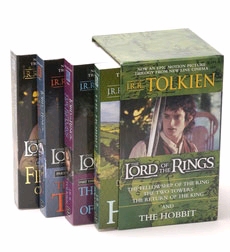 Though it seems odd to me now, both math and a ten-year-old calendar prove I must have read The Lord of the Rings: The Fellowship of the Ring, for the first time, in ten days.
Though it seems odd to me now, both math and a ten-year-old calendar prove I must have read The Lord of the Rings: The Fellowship of the Ring, for the first time, in ten days.
As you may have previously read, I am slightly ashamed to admit my introduction to the mythical universe of J.R.R. Tolkien came very late in life. I did not read The Lord of the Rings until the first film of Peter Jackson’s trilogy had already released.
Only one point in my favor, perhaps: I did finish the first book, before I saw the film.
Now I’m trying to recall my memories, more than ten years later.
You might also recall your Middle-earth memories. When did you first read the books, and/or see the films? On what type of screen did you first see the films, anyway? How also did you react to the extended versions of the films, on the Special Edition DVDs?
‘The Fellowship’ of the book
On Christmas Day, 2001, I received a paperback set of The Hobbit and The Lord of the Rings. Book fans, you may fire your Elven arrows now, for this set was a Movie Tie-In Edition. Frodo with his sword Sting was on the front of Fellowship. On the front of The Two Towers was Saruman; on its back, I think, was a woman with blond hair, whom I learned didn’t even appear in the first book (this, I later found, was Éowyn). Aragorn was on The Return of the King’s front cover, yet he looked a lot like his “Strider” guise.
Anyway, I’m sure I must have sped through Fellowship in ten days, leaving at least one day to begin The Two Towers, before Jan. 5, 2002. That was the day my brother and I saw Fellowship in the theater. I know that I had already begun Two Towers, because the film’s d____ of B______ did not surprise me. (It was, however, a spoiler for my brother.)
As I mentioned, neither book nor film had first drawn me into Middle-earth, but rather clips of the film’s soundtrack, by the incomparable composer Howard Shore.
Unavoidably, that music, with its ancient, nearly sacred, somehow woodsy-scented feel, was in my mind as I read, especially because I had already been listening to the film score CD (with this “Strider” guy on front).
So, what were my first reactions to the book?
- Very “classical.” Lots of odd words that never occurred in Narnia, the only other classic fantasy I had previously enjoyed. Tolkien seemed to assume I knew what Hobbits were, and already accepted this world called Middle-earth. Thus he constantly threw names and places and languages at me, which I tolerated at first. I wanted to explore this place, and learn, and smell that ancient wood …
- Lots of walking. Tolkien liked to take his time on the journey, and not rush to the destination. Even then, I wondered, as even professional fans do on their bad days: why this excessive attention to the Old Forest, and this weird tripped-out enigmatic Tom Bombadil guy who seems to have no real connection to the story?
- Where was the magic? I kept looking for it, partly because of the few rumors I’d heard that LotR didn’t have clear “Christian” magic as Narnia (supposedly) has. Gandalf did use magic, but kept it hidden under his pointy hat. More subtle, that.
- The Elves: it took me days to figure out that they were not the same height or build as the Hobbits and/or Dwarves. Oh, tall and elegant Elves. My mistake. In fact, it may have only been after the film that I figured out the casting of full-size adults for Legolas, Elrond, and Arwen was not a departure from the book.
‘The Fellowship’ of the film
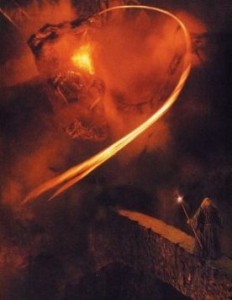
Gandalf versus the Balrog. This scene made me sweat, spellbound, as if the flames and spiritual power were real.
Let me admit something that will bring on the cave trolls (more than one cave troll, you will notice I said). On my bad days, I tend to like the film better than the book. In fact, this is my view even on my good days. In my defense, I can’t help it. To me, the book was highly interesting, but seeing the film just a few days after finishing the book …
It absolutely blew me away.
Three hours long, longer than any film I’d previously seen. Absolutely epic in scope. Things I’d never beheld. Battles and intensity (complete with lopped-off limbs), leaving one breathless. That majestic music, filling the world, intertwined with its struggles and grandeurs. Brave heroes. The ever-growing evil of the Ring and its dark creator. And that Moria sequence, Gandalf and the Balrog … it left me literally sweating and shaking.
Still, because of that short duration between book and film, I had became one of Those People whom true fans either mock, or at best lament: a Lord of the Rings reader whose view of the books is inseparable from the films’ presentations.
I had not the chance to imagine settings and characters on my own. Gandalf is Ian McKellen in costume, Gimli is John Rhys-Davies, and Frodo Baggins never had a chance to be a respectable middle-aged hobbit without a teenage appearance and oddly special-effect-looking blue eyes.
Of course, some of that was a benefit. The film could impress me far more. Because I went in unsure what to expect, I could be stunned. No actor made me wince or recoil because “that’s not my Aragorn.” I didn’t have time to let my imagination of them “set.”
Perhaps better, changes for the film did not faze me at all. (I’ll get to the Faramir storyline in a future column!)
What’s your view, I wonder? In this, was I mostly advantaged, or disadvantaged?
What are the pros and cons of seeing any film before reading the book, or else finishing the book only days before seeing its film version? How did your unique exposure to The Lord of the Rings, whether book first then film, or reversed, help or impair you?



































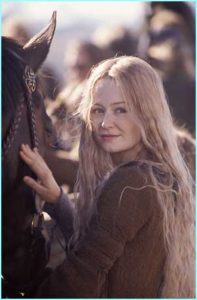

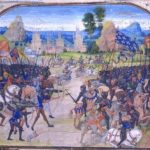
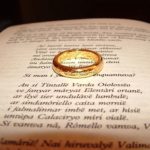
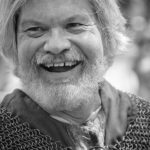
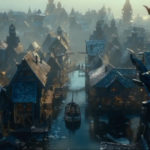



I too only read the books because of the film, but I finish FOTR at least a month before seeing the movie. Now, I’m an anthropology/linguist geek who enjoys world-building, random names, lots of backstory on races, and seemingly-significant characters/scenes who don’t see to have a lot to do with the actual core plot (Tom Bombadil & the Barrowdowns). The book was candy for me, especially because Tolkien is a master of interesting exposition .
The movie did blow me away–on the first sitting. It wasn’t entirely the Middle Earth I was picturing, but it was an acceptable alternate universe, and I enjoyed the fast pacing and fight scenes (neither of which Tolkien is known for). However, I still find the elves cringe-worthy, mostly because of the casting. I can never accept Agent Smith as Elrond. The more I read of the Silmarillion, then the Unfinished Tales, then some of the History of Middle Earth, made me ever more critical of their portrayal, mostly because Tolkien put such effort into making them a full, well-rounded race.
However, upon reading FOTR after ten years (and many writing classes), I found that, while I still loved the exposition and the story, the wooden dialog and the slow pacing were more noticeable. In comparison, I felt about the same about the movies.
In general, I’m a stickler for reading the books in advance of the movie, with enough time to form your own images of the characters. I don’t like the idea of a film-maker having the ability to stick their own idea of a character into my head. It kind of ruins the imagination fun of reading for me.
The imagery and interpretation of the films is still strongly connected to the story for me. I saw the first movie before reading any of the books, and then I read all the books (or actually listened to them with my father) before seeing the second movie. I’ve read the trilogy on my own a couple times since, as well as The Silmarillion and The Hobbit, and I think my conception of Middle Earth is deeper than the way the films portray it, while still being built on the framework of Peter Jackson’s interpretation.
My parents gave me the extended-version DVDs on three consecutive Christmases. I definitely prefer the extended versions better than the theatrical ones, and I think they should be considered the “authentic” editions of the movies. I don’t even remember the theatrical versions that well, anymore. I must have watched all the extended version movies at least three times through, probably not much more than that, because I’m not one to enjoy re-watching the same movie over and over again, even if it’s really awesome. However, I also watched two or three. of the full-length commentaries on the DVDs, including the one with Peter Jackson’s voiceover, so I guess I understand the perspective that the movies took somewhat.
I agree with movie interpretation of Sauron — that he did not have the ability to take physical form, that in the Third Age he was just a spirit represented by the Eye. I believe this is a matter of debate among Tolkien fans/scholars. Some say that he must have taken physical form again after he was killed during the battle against Elendil and Gil-galad (the movie prologue). I believe Sauron was a Maia — a psuedo-angelic being capable of taking physical form, but not bound to any. But I don’t think a physical Sauron sitting around and doing nothing in his Dark Tower is very menacing. 😉
I want to bring up the MMORPG Lord of the Rings Online, and then I’ll discuss a couple scenes that are different between the books and the movies after a spoiler warning. I read a news article on Yahoo several months ago that said Lord of the Rings Online had become Free-To-Play, meaning that anyone can play it for free, but there’s lots of features/character enhancements within the game that can be purchased. I was excited to try to download it when I learned that it was free, but the process of downloading it and installing it was very tedious and painful. You have to sign up for an account, read the EULAs, download the downloader, install the downloader, read the downloader’s EULA, wait days for the downloader to download the game, re-read the EULAs, and then finally you can play the game!
But anyways, I was pleasantly shocked that LOTRO actually didn’t totally murder Middle Earth. I was expecting such horrors as player-character wizards throwing fireballs, half-elves running around everywhere, and respawning after getting killed to run back to your corpse. But there was none of that! The game definitely takes some liberties with a magic system in one of the classes, but it forces players to make characters that fit with Tolkien’s world. For instance, you can’t make a blue-eyed Harfoot Hobbit or a dark-skinned elf. Also, there is no character death in the game at all, so no coming back to life, either. The game seems to be more based on the books than the movies; Elrond is in at least one quest, but he doesn’t look like the actor from the movie.
[spoilers below]
The exclusion of Tom Bombadil was the thing that made my father (an old-time Tolkien fan himself) most angry about the first movie. The scene where Bombadil saves the hobbits from the Old Willow (or whatever it/he was called) is one of the more memorable moments from the book for me. Tom Bombadil serves a purpose in the overal theme. As an anomaly, he demonstrates how ancient and profound Middle Earth really is, far better than any infodump of Tolkien’s exhaustive histories ever could have done.
I think the worst change the movies made was bringing elves to Helm’s Deep (in the Two Towers). An elf army fighting beside men is a big deal in Tolkien’s history! But I don’t know if you don’t want to talk about The Two Towers yet, so I’ll avoid commenting more on the diversions in the movies.
I don’t really mind the structural changes in the movies, such as putting the death of Boromir at the end of The Fellowship of the Ring. The film-makers had a pace to maintain, after all. I love Boromir’s death scene in the movie. It wasn’t really a significant moment in the book (just a sidenote at the beginning of The Two Towers), but in the movie, it’s profoundly moving. The dialog in that scene is excellent.
The Hobbit was my introduction to Tolkien and Middle-Earth, sometime in junior high school. I loved the story, but didn’t move on to the Ring Trilogy until my junior or senior year of high school, since I discovered Lewis in the interim and was delving into Narnia. I vaguely remember reading something in a news article about “Frodo Lives” popping up in college campus graffiti, and deciding I needed to investigate further.
What struck me immediately was the difference in tone between the two books. Where The Hobbit was a lighthearted adventure, even within Gollum’s cavern and Smaug’s lair, the Ring stories were deadly serious. The stakes were huge and the dangers imminent. The One Ring itself transmogrified from the convenient bauble described in The Hobbit to a frightening, toxic weapon. I loved these stories too, but for different reasons.
The various media interpretations of the story didn’t come along until later, and I mostly evaluated them on their faithfulness in portraying the books. Rankin-Bass created a serviceable animated version of The Hobbit for television, and a very-truncated Lord of the Rings (titled “The Return of the King”), and they both captured a hint of the stories’ spirit and poetry, but not the epic scope or emotional weight. Ralph Bakshi tried to bring an animated version of the Ring Trilogy to the big screen in two volumes, but I didn’t enjoy it–it employed an animation technique that was mostly painting over live-action cels, and it stalled out just as the Battle of Helm’s Deep began. Though it performed well at the box office, the second installment was never produced.
I frankly couldn’t imagine anybody successfully bringing Tolkien’s stories to the big screen until Peter Jackson’s films appeared, and I was pleasantly flabbergasted. They weren’t the books, but they respected them and did them justice, capturing them perhaps as well as anyone could, in my opinion. As you noted, the music was a big part of that. I thought Billy Boyd’s song for Pippin that he composed and performed was particularly brilliant.
I don’t think your experience was inferior for encountering the films first. I think each telling offers a slightly different perspective of stories so rich they can certainly permit and benefit from multiple approaches. And if you haven’t yet, do read The Silmarillion, which provides Tolkien’s cosmology and creation story for Middle-Earth and all its inhabitants.
As to Frodo, I always saw him, despite his age, as a teenager, perhaps because I met the stories as a teenager. His journey was a coming-of-age story, and by its end, with the scouring of the Shire and his departure from the Grey Havens, he’d become an adult in my eyes.
I read the books specifically so I would be allowed to see the movies, by my parent’s rule, and the first copies I owned and read were the movie tie-in paperbacks, so my vision of the characters was very skewed by the films. But I don’t mind… I admit, I am not a very hard-core Tolkien fanatic. I just love Middle-Earth. While there are parts of the movies where I wish they’d been more faithful to the books, all in all I think the films are beautifully done and I’d rather watch them than read the three long books (don’t kill meeee!).
I did, however, manage to read the Harry Potter books this past summer without being “tainted” by the movie, and I really enjoyed having my own versions of the characters and places stowed away in my mind. Sadly, after I saw the movies my own visuals faded away – except Hogwarts, which is so creepy and gloomy in the movie, and which I always pictured as a gleaming, tidy, magnificent kind of place. Sorry, that’s a bit off topic. I guess my point is, I really like having my own visuals when I read books, and I wish I had my own version of LotR to imagine. I DO have my own version of The Hobbit, and I’m not looking forward to having that squashed by a movie version too…but I’m looking forward to the movie too much to care a ton. 🙂
I will go into that movie with a much more critical eye, however. The Hobbit was read to me when I was quite young, and I’ve had years to care about the book in its pure, Tolkien-written form. I’ll be upset if they do anything too drastic! But probably Peter Jackson’s filmmaking will woo me over eventually…
I loved the books for decades before the Peter Jackson movies. When I saw the first movie, I was galvanized. I did not sleep the entire night after the movie because I replayed the movie in my mind three times.
Why they picked an ugly man like Agent Smith to be Elrond, I’ll never know, but for me all the characters I had imagined now look exactly like the actors (save Elrond), and that’s fine by me.
Movies are different things from books, and must be much simpler. I knew there would be changes, and I did not note any that detracted from the mood and themes of the books, unlike the third Narnia movie that trashed the themes while conveying the physical beauty of Narnia. The Bakshi movie was an abomination, much like the man himself.
I refuse to pass judgement. I was a LotR fan for at least nine years before the movies (I’ve got a book report on Return of the King that I did for school in 1992), and when the movies came out, I realized I had a choice. I could either stick my nose in the air and look down on all these new fans who hadn’t suffered as I had suffered, or I could grab my very first opportunity to make friends over something geeky!
And I was kinda jealous of the people who walked into that theater without a clue as to what was about to hit them. There are few times in life that a person ever gets a chance to be blown away. That was one.
There are disadvantages to being an old fan. I found out I’d been mispronouncing “Moria” for years. *g*
To me, the movie and the book are two different beasts. They’ve both got their good points (movie!Boromir is more sympathetic than the original, but movie!Denethor is less), and I love them both. One thing, however: I can’t watch the movie if I’ve recently read the books, or I’ll get mad at all the changes and not appreciate the way it stands so beautifully on its own.
I’m a fan of the books from way before the movies came out. But the Harry Potter books and movies taught me that the movie will be a mass slaughter of the book I loved, so not to get my hopes up too high.
Therefore Peter Jackson surprised me. The LOTR movies were good, as movies. They couldn’t stick exactly to the book, but Tolkien himself admitted that the books were unfilmable. Peter Jackson and his crew worked feverishly to make the movie as close to the spirit of the books as they could, and I respect that. I was glad they included the Aragorn/Arwen subplot, because that should have been in the full book and not relegated to an appendix.
Sometimes I’d rather watch the movie than read the books. I do listen to the soundtrack when I read the books now. Unfortunately, my siblings and I made a silly LOTR spoof with Legos, and many of our jokes run through my head now as I watch the movies (like calling Haldir, the elf at Helms Deep, “Pudgy”). Or the running joke about Elrond/Agent Smith proclaiming, “Hobbits are a virus.”
I don’t know. I love the movies for what they are and the books for what they are. If you read the books very slowly and consult the maps, and make sure you take the time to envision all the walking scenes very clearly, it’s a spectacular read. Slow, but very vivid.
That’s almost exactly how I got into it as well. I think the movies have their place in the mythology as well, considering his comment in the letter that become the Silmarillion prolouge:
The cycles should be linked to a majestic whole, and yet leave scope for other minds and hands, wielding paint and music and drama.
I grew up with the books — hearing my father read them aloud to my brothers is one of my earliest clear memories — and read them myself multiple times. When I heard the movie was coming out I was quite excited as it looked like it was going to be truly faithful to the books; I’d attended an exhibition of props and costumes from the films and was in awe of their authenticity and attention to detail. So when my husband and I managed to steal some time away from my six-month-old son to see the film, I was shivering all over with anticipation.
Sadly, I came away disappointed. Oh, the casting and acting were excellent (except for Elrond, who was just skanky-looking and crabby all the time — sorry, Hugo Weaving, you were a great Agent Smith but you are NOT Elrond), and the look of the movie was breathtaking, but I found myself numb and indifferent to all the ACTION ACTION ACTION BATTLE BATTLE BATTLE INSERT VERY UN-TOLKIENESQUE SCENE OR JOKE HERE MORE ACTION STOP that seemed to be going on. Where were the quiet, thoughtful moments that defined the characters so well? Who was this Aragorn who didn’t even seem to know who he truly was, or want to be king? I didn’t mind the trimming of Tom Bombadil and other scenes that would have distracted from the main thrust of the movie, but I strongly resented the insertion of dialogue and scenes that did not, to me, fit the spirit of Tolkien’s books as all.
I thought perhaps I was just being too picky and precious about this and that I ought to accept that movies were different from books etc., but when I saw the film of THE LION, THE WITCH AND THE WARDROBE (a book even dearer to my heart than LotR) I noticed all the changes and additions they’d made but I still absolutely loved it. (I can’t say the same for PRINCE CASPIAN, sadly; it suffered from all the same ACTION ACTION ACTION problems as the LotR films, and worse.)
So anyway, I did diligently go to see all three of the LotR films, hoping each time that I would feel differently and that I would be able to join the ranks of my friends who were wildly enthusiastic about the movies. But that longed-for change of heart never happened (dwarf-tossing jokes? ARE YOU KIDDING ME), and by the time I got to my beautiful, noble Faramir lusting after the Ring and the ice-cold, ascetic Denethor being turned into a boozing, gluttonous idiot who ran off a cliff in flames, I was in a state of CAPSLOCK RAGE (similar to my feelings about Peter’s characterization in the movie of Prince Caspian, oh don’t make me relive that horror again I don’t even want to think about it).
I might have feared there was something wrong with me for not loving these movies as much as everyone else. But my husband, who had only read the books once before he saw the film (and only because I read them all out loud to him when we were first married) felt exactly the same way as I did — too much Hollywood and post-modern blathering, not enough Tolkien. And he still felt that way even after he sat down and watched the Extended Editions of all three films back-to-back, which was something I could never find the heart to do myself.
Anyway. All that being said, I’m still ridiculously excited for THE HOBBIT. So I’m not entirely cynical about the prospect of a great Tolkien movie yet, nor am I even totally soured on Peter Jackson. (Especially not now that I’ve seen his TINTIN, another childhood treasure of mine, and loved it.)
Whew! As someone recently said to me, Well, why not say how you really feel? 😀
This is exactly what I meant when I said that I may have benefited from not having been a fan for years and years before I saw the films. The “Dwarf-tossing” jokes did not bother me, and I’ve even gotten used to Arwen saying “What’s this? A Ranger, caught off his guard?” (Her classical behavior later — though we all dodged an Orc-axe, with Arwen almost fighting at Helm’s Deep! — made up for it, in my view.)
At the same time, other longtime fans of the books, while being irked by some changes made to the film — like Faramir, whom I hope to address in a future column — were okay with the films, and in fact loved them.
I wonder how the disparate reactions arise, between equal fans?
Take heart, though, R.J. At least neither Jackson, nor Adamson (director of LWW and Prince Caspian), did not lower their adaptation and filmmaking skills (not even Adamson, in the flawed Prince Caspian) to the absolute bottom-of-the-ship’s-rum-barrel level attained by The Voyage of the Dawn Treader film (2010).
After all, one does not simply rock into Mordor.
http://i694.photobucket.com/albums/vv302/esotericus/JidhzX7gqoijqt2pjlsSqcxMo1_500.jpg